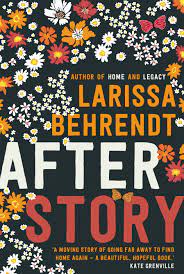Larissa Behrendt’s novel After Story (UQP 2021) is a blending of narratives, styles and themes, with appeal to those who love the traditions of English literature such as Shakespeare and Austen, and equally those who want to learn more about First Nations history. It is also a genre-bender, as it contains a subtext of crime, or rather the aftermath and repercussions of crime, and how that effects family, friends and the wider community.
It is the same story told in alternating chapters by two narrators – Indigenous lawyer Jasmine, and her mother Della. The two are travelling together on a literary tour of England, learning about famous writers such as the Bronte sisters and Virginia Woolf through visiting their childhood homes, the places they studied and wrote, and museums dedicated to their work. For Jasmine, the trip is a chance to indulge in the lives of her literary heroes, plus a way to regain closeness with her mum. For Della, the whole experience is astonishing – everything she sees and learns, the people she meets and the places they visit. But the biggest surprise of all is that the trip awakes in her a yearning for the wisdom and storytelling of her own culture, as the comparisons between two cultures and two histories often conflict.
Behind the simple tale of a tourist tour is a more serious undertone, the fact that Jasmine’s sister disappeared over 25 years earlier. The toll this has taken on the family simmers constantly under the surface, affecting the dynamics of all the relationships in their tight-knit community. And when a little girl goes missing on Hampstead Heath during their trip, the memories come thick and fast for Della, and open a floodgate on her own childhood and the secrets she has kept for her whole life.
The book is organised into the 10 days of the trip and Behrendt has a lovely way of writing that is easy to read yet overflowing with knowledge. Della discovers the history of English writing with a refreshing naivety and ingenuousness, but what it unleashes in her is a renewed interest and commitment to her own culture and storytelling. Jasmine realises that although she is book smart, her mother has knowledge and secrets that run deeper than she suspected, and that sometimes not all stories are told.
With themes of reconciliation, family dynamics, grief and loss, great literature and compassion, After Story pulls the reader into a fascinating history of the works of great authors, but also introduces us to the equally as important and impressive oral history of Australia’s First Nations people. It also traverses the difficult and confronting territory of social poverty, alcohol abuse and domestic violence. The characters are flawed and nothing is black and white. It is a story as much about the lack of knowledge of some First Nations people about their own history – or the lack of the curation and preservation of that knowledge – as it is about the ignorance and superiority of previous and current (white) generations.
And while the book does negotiate such difficult terrain, it is also a hopeful and optimistic story about the power of love, family, history, culture and connection, featuring relatable characters. The exploration of the mother/daughter bond is especially rich and layered.
At the end is ‘Jasmine’s Tour Reading List’, full of great English works, and also ‘Notes on the Literary Tour’ which enable the reader to embark on their own similar, self-guided tour (Covid permitting, of course!)

